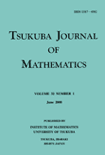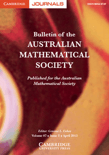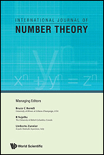
Research in Number Theory
metrics 2024
Where groundbreaking research meets mathematical excellence.
Introduction
Research in Number Theory is a prestigious journal eagerly embraced by the mathematical community, focusing on the intricate and profound aspects of algebra and number theory. Published by Springer International Publishing AG, the journal showcases cutting-edge research from 2015 to 2024, making it a pivotal platform for advancing knowledge in its field. With its ISSN 2522-0160 and E-ISSN 2363-9555, this journal holds a commendable position in the academic ecosystem, as evidenced by its ranking in the Q2 quartile for the category of Algebra and Number Theory in 2023. Despite being positioned within a competitive percentile, this journal aims to foster innovation and discovery, providing researchers, professionals, and students with valuable insights into the ever-evolving landscape of number theory. While the journal currently operates under a traditional publishing model, it is committed to disseminating high-quality, impactful research that propels the discipline forward. Join the conversation and contribute your work to a publication that is at the forefront of mathematical discovery.
Metrics 2024
 -
- 0.60
0.60 0.60
0.60 -
-Metrics History
Rank 2024
IF (Web Of Science)
JCI (Web Of Science)
Quartile History
Similar Journals

RENDICONTI DEL SEMINARIO MATEMATICO DELLA UNIVERSITA DI PADOVA
Innovative research shaping the future of mathematical disciplines.RENDICONTI DEL SEMINARIO MATEMATICO DELLA UNIVERSITA DI PADOVA, published by the European Mathematical Society, stands as a notable open-access journal with a rich history in disseminating research across various domains of mathematics. With an ISSN of 0041-8994 and E-ISSN 2240-2926, this journal has embraced open access since 2023, significantly enhancing its visibility and accessibility to a global audience. Situated in Germany, its publishing house is based at Technical University Berlin, which emphasizes its academic roots and dedication to fostering mathematical research. The journal features a quartile ranking of Q3 across multiple categories including Algebra and Number Theory, Analysis, Geometry and Topology, and Mathematical Physics as of 2023, indicating a vibrant contribution to the field, despite its challenge in specific rankings. Researchers, professionals, and students alike will find in this journal a platform for innovative ideas and significant findings that are crucial to the evolution of modern mathematics.

Annales Mathematiques du Quebec
Pioneering Research for a Mathematical TomorrowAnnales Mathematiques du Quebec, published by Springer Heidelberg, is a distinguished journal dedicated to the dissemination of innovative research in the field of mathematics. With an ISSN of 2195-4755 and E-ISSN 2195-4763, this scholarly publication has indicated its commitment to high-quality peer-reviewed articles since its inception in 2013. Situated in Switzerland, the journal is recognized for its contribution to the mathematical community, evidenced by its current Q2 ranking within the miscellaneous mathematics category in 2023. Though specific open access options are not detailed, the journal maintains prominence through its rigorous standards and relevance, with a Scopus rank of #248 out of 399, placing it in the 37th percentile in the category of General Mathematics. Researchers, professionals, and students are encouraged to engage with the latest findings and insights published in this journal, which aims to foster collaboration and innovation in mathematical research.

Documenta Mathematica
Connecting Mathematicians with Cutting-Edge ResearchDocumenta Mathematica is a premier academic journal published by the European Mathematical Society (EMS), making significant contributions to the field of mathematics since its inception. With an Open Access model established in 1996, the journal ensures that scholarly works are freely available to a global audience, promoting widespread dissemination of mathematical research. Based in Germany, it serves as a vital platform for mathematicians, covering a wide array of topics within the discipline, evidenced by its impressive Q1 ranking in the miscellaneous category of mathematics as of 2023. Featuring rigorous peer-reviewed articles that span the latest trends and breakthroughs in the discipline, Documenta Mathematica also retains a commendable position among its peers with a Scopus rank of 163 out of 399, placing it in the 59th percentile for general mathematics. Researchers, professionals, and students alike will benefit from the robust scholarly content and the journal's commitment to advancing mathematical knowledge.

Tokyo Journal of Mathematics
Celebrating Over Four Decades of Mathematical ExcellenceTokyo Journal of Mathematics is a prestigious journal dedicated to the dissemination of high-quality research in the field of mathematics. Founded in 1978, this journal serves as a platform for researchers to publish their findings, providing cutting-edge insights into various mathematical theories and applications. Published by the TOKYO JOURNAL MATHEMATICS EDITORIAL OFFICE ACAD CENTER, the journal is based in Japan and forms an integral part of the global mathematical community. Although listed in the Q4 quartile of Mathematics (Miscellaneous) category for 2023, its inclusion in Scopus rankings highlights its ongoing commitment to scholarly excellence. The journal does not currently offer Open Access options, thus providing readers with insightful access to critical advancements in mathematics. With an ISSN of 0387-3870 and a publication history spanning over four decades, the Tokyo Journal of Mathematics remains an essential resource for researchers, professionals, and students alike, fostering the advancement of mathematical knowledge and collaboration across borders.

MANUSCRIPTA MATHEMATICA
Elevating Research in Mathematics.MANUSCRIPTA MATHEMATICA is an esteemed journal in the field of mathematics, published by Springer Heidelberg. Since its inception in 1969, this journal has served as a pivotal platform for disseminating high-quality research in a variety of mathematical disciplines, with a commitment to advancing knowledge and fostering collaboration among mathematicians. The journal holds a commendable impact factor and is ranked within the Q2 category for Mathematics (miscellaneous) in 2023, placing it favorably among its peers in terms of academic influence. Although open access options are not available, its rigorous peer-review process ensures that published articles maintain the highest academic standards. With a wide scope covering significant areas of general mathematics, MANUSCRIPTA MATHEMATICA not only caters to researchers and professionals seeking innovative insights but also serves as a valuable resource for students eager to deepen their understanding of mathematical theories and applications. For those looking to contribute to or stay informed about advancements in this dynamic field, the journal remains a crucial resource for literature and discourse.

PUBLICATIONES MATHEMATICAE DEBRECEN
Advancing Mathematical Frontiers with Rigorous ResearchPublicationes Mathematicae Debrecen is a renowned international journal published by the University of Debrecen, Institute of Mathematics, situated in Hungary. This journal, with both ISSN 0033-3883 and E-ISSN 2064-2849, has established itself in the field of mathematics since its inception, with coverage extending from 1997 to 2024. Recognized for its rigorous academic standards, it currently holds a Q3 ranking in the mathematics (miscellaneous) category for 2023 and ranks at the 42nd percentile among general mathematics journals in Scopus. Publicationes Mathematicae Debrecen aims to disseminate high-quality research across various areas of mathematics, contributing to the advancement of knowledge and practice in this dynamic field. Although it is not an open-access journal, its readers can access a wealth of scholarly work that addresses both theoretical and applied mathematical issues, making it an invaluable resource for researchers, professionals, and students alike.

Tsukuba Journal of Mathematics
Fostering Innovation in Mathematics through Scholarly ExchangeTsukuba Journal of Mathematics is a distinguished publication dedicated to advancing the field of mathematics through the dissemination of innovative research and comprehensive studies. Published by the University of Tsukuba, Department of Mathematics, this journal serves as a vital platform for mathematicians, researchers, and students to engage with cutting-edge mathematical theories and methodologies. Although currently not available as an open-access journal, it maintains a strong academic presence, contributing significantly to the global mathematical landscape. The journal invites submissions across various branches of mathematics, aiming to foster scholarly communication and collaboration. The ISSN 0387-4982 and the E-ISSN 2423-821X further establish its credibility and accessibility among the academic community, supporting its critical objective of facilitating high-quality research output. Situated in Tsukuba, Japan, a hub for scientific research and development, the Tsukuba Journal of Mathematics is committed to bridging gaps in mathematical knowledge and encouraging exploration of novel ideas.

BULLETIN OF THE AUSTRALIAN MATHEMATICAL SOCIETY
Elevating Mathematics: A Journal of DistinctionBULLETIN OF THE AUSTRALIAN MATHEMATICAL SOCIETY is an esteemed journal dedicated to advancing the field of mathematics, published by Cambridge University Press. Since its inception in 1969, this periodical has fostered scholarly communication and showcased pivotal research in various domains of mathematics, now projected to continue until 2024. With an impact factor that places it in the Q2 category of miscellaneous mathematics research, it holds a notable position among its peers, ranking 215th out of 399 in the Scopus database. Though it does not currently offer open access options, the journal remains a vital resource for researchers, professionals, and students seeking to deepen their understanding of mathematical advancements. The Bulletin serves as a crucial platform for disseminating original research, comprehensive reviews, and insightful perspectives that navigate the complexities of mathematics today, ensuring the community is well-informed and engaged.

Analele Stiintifice ale Universitatii Ovidius Constanta-Seria Matematica
Connecting Ideas and Insights in the World of MathematicsAnalele Stiintifice ale Universitatii Ovidius Constanta-Seria Matematica is a prominent open-access journal established by OVIDIUS UNIV PRESS in Romania, dedicated to advancing the fields of mathematics, specifically in Analysis and Applied Mathematics. Since its inception, the journal has emphasized the dissemination of high-quality research, making it accessible to a global audience. With an ISSN of 1224-1784 and E-ISSN 1844-0835, it has positioned itself within the academic community, achieving a respectable Q3 ranking in both analysis and applied mathematics in 2023, reflecting its commitment to rigorous scholarship. The journal spans a considerable publication window from 2009 to 2024, catering to the ongoing developments in mathematical sciences and their applications. Researchers, professionals, and students alike will find valuable insights and contributions that enrich their understanding and foster collaboration within the mathematical community. The journal's headquarters is based at the Faculty of Mathematics & Computer Science, Bulevardul Mamaia 124, Constanta, Romania.

International Journal of Number Theory
Fostering Innovative Ideas in Mathematical ResearchInternational Journal of Number Theory is a prestigious scholarly publication dedicated to advancing the field of mathematical research, particularly in algebra and number theory. Published by WORLD SCIENTIFIC PUBL CO PTE LTD and situated in Singapore, this journal boasts an impressive reputation, holding a Q2 quartile ranking in its category for 2023. With a commitment to disseminating peer-reviewed research, the journal features works that explore both foundational and contemporary issues related to number theory, making it an essential resource for mathematicians, researchers, and students alike. Spanning from 2008 to 2024, the journal embraces a wide range of topics within the discipline, promoting innovative ideas and fostering academic discourse. Although it does not currently offer open access options, its rigorous selection process ensures that published articles maintain high standards of quality and impact, contributing significantly to the global mathematics community.